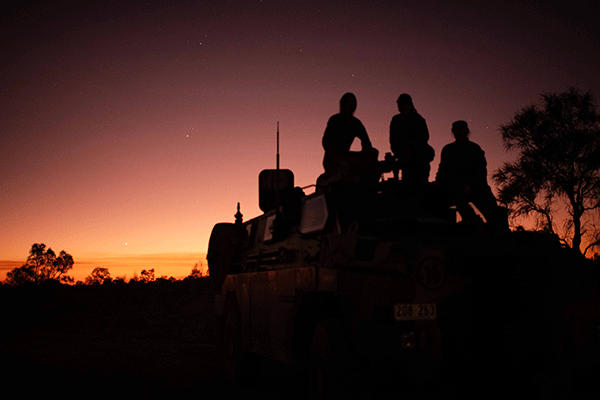
After two weeks of high-end warfighting, Exercise Talisman Sabre 2023 (TS23) has officially closed.
Held across five states and territories over a two-week period, more than 34,000 military personnel from 13 nations joined forces across sea, land, air, cyber and space.
Australian and United States military personnel deployed alongside soldiers, sailors, marines and aviators from Canada, Fiji, France, Germany, Indonesia, Japan, New Zealand, Papua New Guinea, the Republic of Korea, Tonga and the United Kingdom.
Military personnel from India, the Philippines, Singapore and Thailand observed the exercise.
In its tenth iteration, TS23 reflected Australia’s enduring military partnership with the United States and strengthened relationships between trusted allies and like-minded nations.
Chief of Joint Operations Lieutenant General Greg Bilton said TS23 had tested skills in combat readiness and interoperability between all the participants.
“This was a complex series of training activities that allowed us to test our combined capabilities across sea, land, air, cyber and space operations,” Lieutenant General Bilton said.
“Tragically we lost four soldiers when their helicopter impacted waters near Lindeman Island during a night-time training activity. The immediate search-and-rescue operation, and support provided by our international defence partners and civilian agencies, was a comfort to our people, and a demonstration of our strong and genuine relationships.
“These relationships are strengthened by multi-national activities like Talisman Sabre, which ensure we are able to work together whenever and wherever needed.”
United States Commanding General I Corps Lieutenant General Xavier T. Brunson said Talisman Sabre reinforced commitments to regional security.
“Talisman Sabre has strengthened our collective commitment to promoting peace, security and stability in the Indo-Pacific,” Lieutenant General Brunson said.
“This event is a testament to the bond between nations, not just the Australian and United States alliance, but also the 11 other participating countries. The vast scope and scale of this year’s exercise speaks to the shared understanding of maintaining a strong network of friends, partners and allies.
“By integrating all branches of the military, and multiple domains, we ensure we are better able to meet the security challenges of our times.”
TS23 Exercise Director Brigadier Damian Hill praised communities across the country for their support throughout the two-week exercise.
“Across Queensland, including Norfolk Island, and throughout the Northern Territory, Western Australia and New South Wales, communities have enabled us to conduct our essential training in and around their public spaces. At times they’ve even played an active part in the exercise as role-players to make our training as realistic as possible,” Brigadier Hill said.
“With their support we’ve been able to achieve increasingly complex activities that have tested our combined logistics capabilities and enhanced our interoperability in live-fire activities, field training exercises, amphibious landings, ground force manoeuvres, air combat and maritime operations.”
Consisting of a field training exercise incorporating complex logistics across an area as vast as the Australian continent, amphibious landings, ground force manoeuvre, air combat and maritime operations, key TS23 activities included:
- More than 34,500 personnel deployed across Australia.
- More than 17,000 personnel operated in the maritime environment across 27 ships and submarines.
- More than 17,500 deployed in land-based field training areas across Australia’s Top End, between far north Western Australia to Weipa in Queensland, and as far south as Jervis Bay, NSW.
- More than 2800 personnel deployed to seven airbases operating across the Northern Airbase network to sustain high-intensity air operations.
- Indonesia, Fiji, France, Germany, Papua New Guinea and Tonga participated in Exercise Talisman Sabre for the first time.
- In an Australian-first, the ADF were able to work with US partners to employ the Army Tactical Missile System (ATACAMS), which successfully fired and struck a long-range target. The ATACAMs system is highly mobile and has a range of 300km. This activity demonstrated complex logistical support and coordination between Australian and US forces to employ this system across vast distances as part of a multi-domain strike capability.
- The first live-fire of a Japan Ground Self-Defense Force Type 12 Surface-to-Ship and Type 3 Chu-SAM Surface-to-Air missiles in Australia.
- The Republic of Korea deployed its K-239 Multiple Launch Rocket Systems and K-9 ‘Thunder’ Self-Propelled artillery system to Australia for the first time.
- The US Navy and Army established a temporary 3km-long ship-to-shore petroleum line in North Queensland, showcasing how military forces can be sustained in a remote area.
- The US military and the ADF built a 540m floating pier at Bowen, Queensland.
- More than 500 individual missions conducted across the North and North West of Australia from more than 50 deployed aircraft to support decisive airpower covering 7000km of Australian coastline.
- For the first time, the rapid activation of contingency airbases RAAF Base Scherger and RAAF Base Curtin concurrently.
- For the first time, RAAF KC-30A aircraft worked domestically with US KC-46A Pegasus tankers to provide coordinated air-to-air refuelling of other aircraft.
- For the first time, RAAF deployed their Deployable Defence Air Traffic Management and Control System comprising of a deployable radar sensor and control cabin to provide Joint Battlefield Airspace Control and air traffic management throughout the exercise.
- Special Operations undertook projection of forces as far as Norfolk Island.
In memoriam
Defence offers its deepest condolences to the families of the four soldiers who tragically lost their lives during a training accident as part of Exercise Talisman Sabre 2023 off the coast of Queensland on Friday July 28, 2023.
Australian Army Captain Danniel Lyon, Lieutenant Maxwell Nugent, Warrant Officer Class Two Joseph Laycock and Corporal Alexander Naggs tragically died when the helicopter they were flying impacted waters near Lindeman Island.






